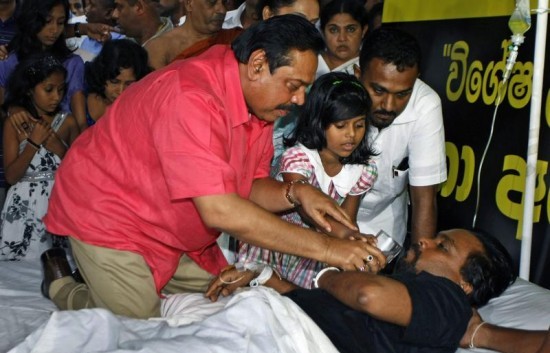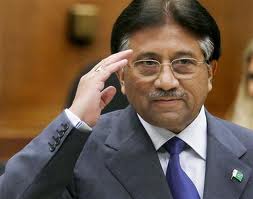Rajapaksa regime must learn from Pakistan’s struggle for democracy
Impeachment
The government’s plan to impeach Chief Justice Shirani Bandaranayake appears to be running
into unforeseen problems. The indications are now that the government’s charge sheet against the Chief Justice is not as watertight as the proponents of the impeachment motion had believed. In addition, opposition to the impeachment has come from an unexpected quarter. The four chief priests of the Buddhist Sangha have expressed their displeasure in a written statement.
Bar association and Sanga
This has been followed by the Bar Association’s call to the government to reconsider the impeachment. Apart from die-hard government supporters there appears to be little or no public support for the impeachment amongst the intelligentsia. Those who are in the government camp, such as a group of lawyers of the rank of President’s Counsels, did not feel it prudent to let their names be attached to a statement they put out in support of the government view.
Loss of popular sympathy
In these circumstances, the government would be concerned about the loss of popular sympathy and the possible fragmentation of its voter base. It needs another cause that will rally popular support. The strategy it seems to be using to regain lost ground is an appeal to ethnic majority Sinhalese nationalism.
Clever stratagems of the Rajapksas
The government has shown itself to be sophisticated in offering different sections of the polity

President Rajapakse provides water to Wimal Weerawansa who was on a death fast in front of the UN headquarters in 2010 (File photo)
what they would like to have, so as to keep them quiet on other issues. This may account for the sudden floating of the idea of a 19th Amendment to the constitution that will abolish the scheme of devolution of power contained in the 13th Amendment and put in place an alternative structure to ensure a solution to the ethnic problem. The 13th Amendment has always been a controversial piece of legislation, as it deals with an issue on which there is no consensus in the country, which is the ethnic conflict and its political resolution.
Wimal Weerawansa to the rescue
So now comes government minister Wimal Weerawansa, a fiery orator known to have close links to President Mahinda Rajapaksa who has filed legal action in the courts of law to repeal the 13th Amendment. The government would hope that this will help to reunify its ethnic majority Sinhalese support base. As Minister Weerawansa is not a member of the ruling party but is a member of a coalition party, the government retains the option of distancing itself from this legal action if it runs into serious trouble. The proposed repeal may be rejected by the courts or it can be opposed internationally, especially by India, in a manner that the government deems detrimental to itself. In such a situation the government is likely to claim that the initiative was one that was solely that of the minister in question. However, at the present time, the government gives an impression that it intends to push ahead with its decision that the 13th Amendment needs to go.
Strengthened devolution
The fear of divisive forces that exist both within and outside countries is not limited to Sri Lanka. Take Pakistan for instance. There is justifiable concern amongst Pakistanis that their country is threatened by powerful international actors in a manner that could divide it. Virtually every day there are reports of bombings and attacks on military installations and civilian targets in that country. Last week I visited Pakistan to attend a conference at the University of Karachi
on “Federalism in pluralistic developing societies: learning from the European experiences.” But as the conference in the University of Karachi demonstrated, the academic community in Pakistan is prepared to discuss the concept of federal government along with politicians and share it with their students. One of the issues discussed was the transfer of powers from the central government to the provincial governments.
18th Amendement
The 18th Amendment to the Pakistan constitution was passed into law in 2010. This amendment reduced the powers of the presidency, including the President’s power to dissolve Parliament unilaterally. It was the first time in Pakistan’s history that a president relinquished a significant part of his powers willingly and transferred them to parliament and the office of the prime minister. Senator Mian Raza Rabbani who is considered as the architect of the 18th Amendment addressed the conference in his capacity as chief guest and said, “We can learn and understand various concepts.
Home-grown solutions
We looked at several constitutions of countries with a federal system including Switzerland, Germany and Canada when drafting the 18th Amendment. But at the end of the day it came down to home-grown solutions.” Senator Rabbani said the amendment had given rise to federalism in Pakistan. “Seventeen ministries have been devolved. After 1947 it is perhaps the biggest structural change in our governmental machinery. It is not a perfect document — it has its ups and downs.”
Pakistan
Among other changes made by the 18th Amendment in Pakistan, courts will no longer be able to endorse suspensions of the constitution, a judicial commission will appoint judges, and the president will no longer be able to appoint the head of the Election Commission. It is therefore ironic that the 18th Amendment in Sri Lanka, which was also passed in 2010 is very much the reverse of the 18th Amendment in Pakistan.
Powers of government meant to be shared
It further centralized powers of appointment of high state officers in the Presidency. As a country that continues to battle terrorism that comes from beyond its borders as well as within the country, Pakistan has more reason than Sri Lanka to fear the weakening of its central government. But the more enlightened political leaders of Pakistan have realized that the powers of government are meant to be shared and not hogged by a few persons and that it is the legitimacy that accompanies the system of shared governance that will best keep Pakistan together.
Looking outside
In making efforts to resolve conflicts in a manner that paves the path to the rapid development of the country’s productive forces, the government can look outside Sri Lanka to see how other countries have solved their problems and are forging ahead. Government leaders, most notably President Mahinda Rajapaksa, have frequently said that they look to Asian countries for inspiration. One of the Asian countries that the government can embrace is Pakistan, which stood by successive Sri Lankan governments during the years of war. However, even in post-18th Amendment Pakistan, the struggle to sustain democracy continues. The devolution of powers is resisted by the central government authorities. The military, that once ruled Pakistan, has its own national security concerns and continues to put pressure on the democratic leaders.
When Musharraf sacked the CJ
In Pakistan, the memory is still fresh how President Pervez Musharraf who originally took power in a military coup, had sacked Chief Justice Iftikar Mohammed Choudhry in 2007. But this led to mass protests and in 2008 it was President Musharraf who had to step down and flee the country. Chief Justice Choudhry was reinstated along with all other judges who were sacked. In a widely reported speech that coincided with the holding of the international conference on federalism that I attended, Chief Justice Iftikar Mohammed Choudhry referred to the role of the Supreme Court in the governance of Pakistan. He said that the Supreme Court had been restored to its rightful position by “an unprecedented struggle carried out by a consort of such professional classes as lawyers, students, media persons and civil society at large.”
Pakistan Chief Justice
In the course of his speech the Pakistan Chief Justice said, “Gone are the days when stability and security of a country was defined in terms of numbers of missiles and tanks as a manifestation of hard power available at the disposal of the state.” Therefore, he said “A heavy responsibility lay upon Supreme Court judges for being the guardians and protectors of the constitution to uphold the canons of the constitution’s predominance and its supremacy over all other institutions and authorities.” The outcome of multiple crises affecting the country is unclear at the present time. The challenge will be to resolve them in a manner that is constructive in the longer term rather than to more severe conflict. At a time when the Sri Lankan government is planning to impeach the Chief Justice and to undo the devolution of powers found in the 13th Amendment, it should look to Pakistan’s example and listen to the wise counsel of its democratic leaders.


